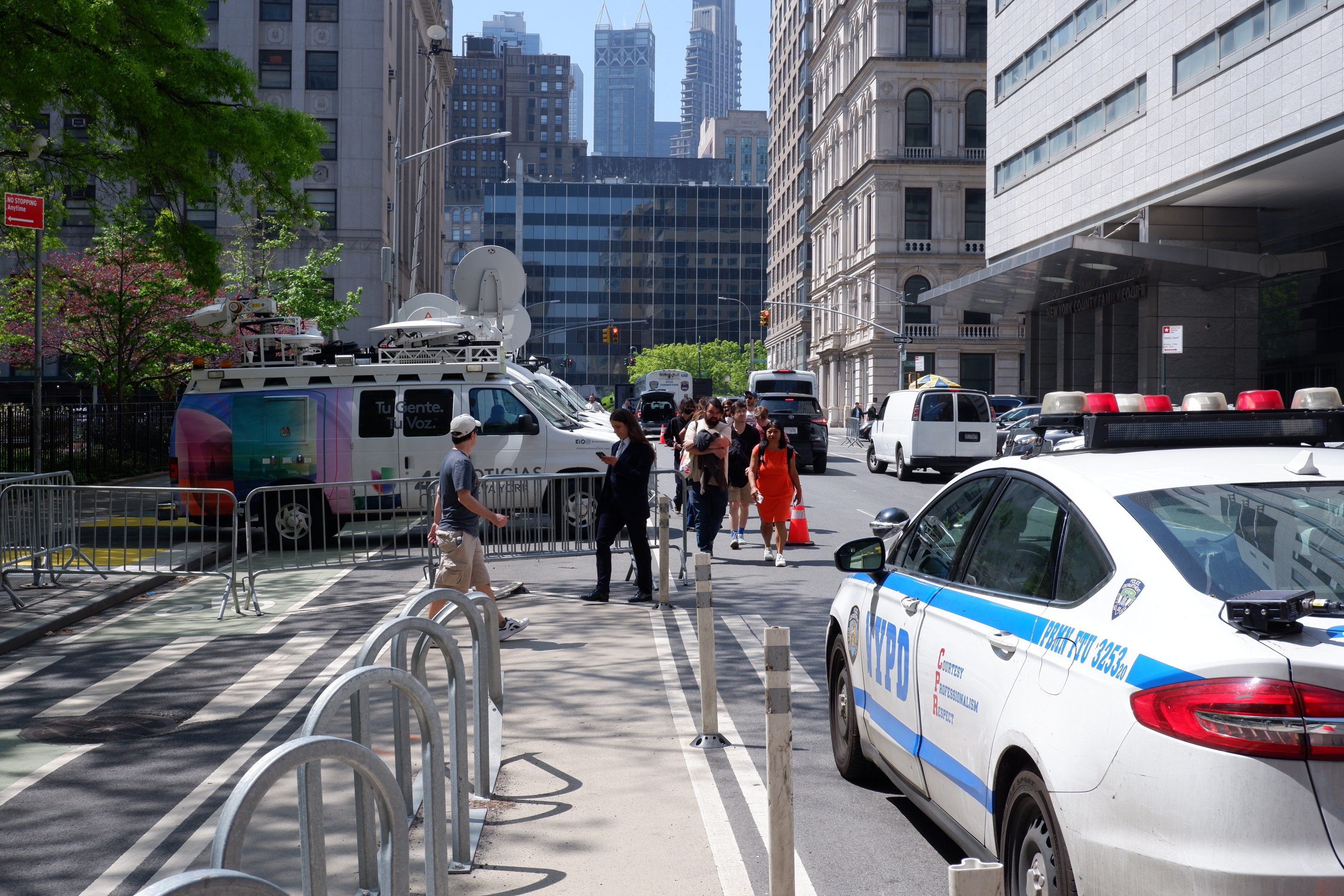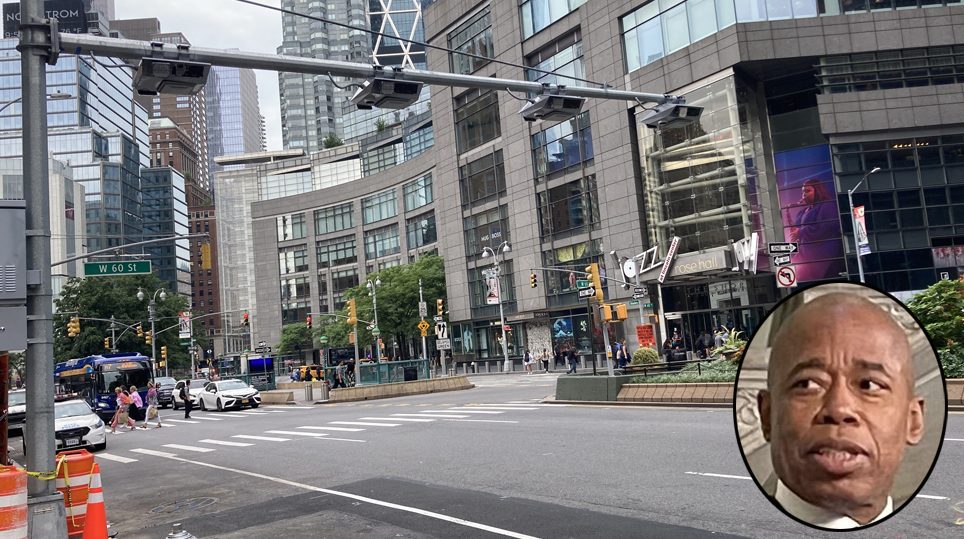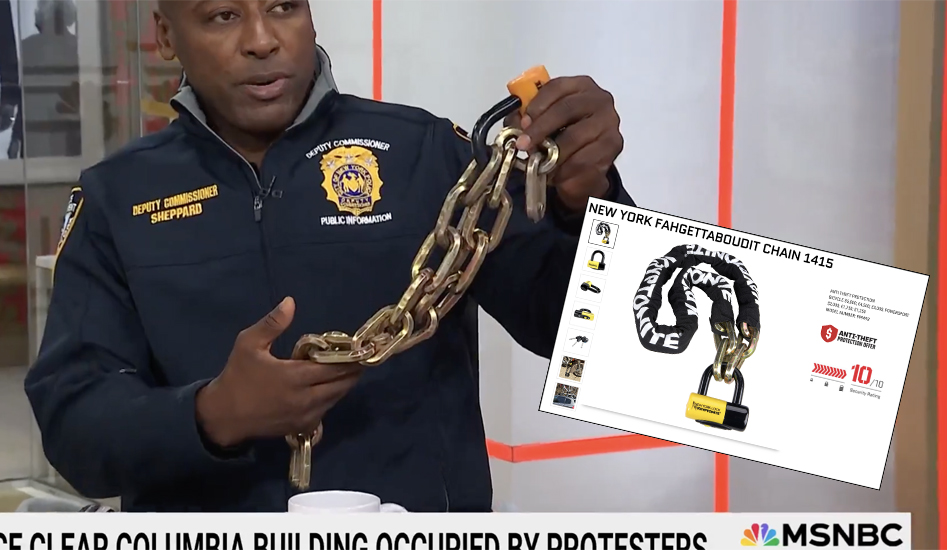BRUTAL MATH: The NYPD’s $6B Budget Must Be Cut, Advocates and Lawmakers Say
1:52 PM EDT on June 4, 2020
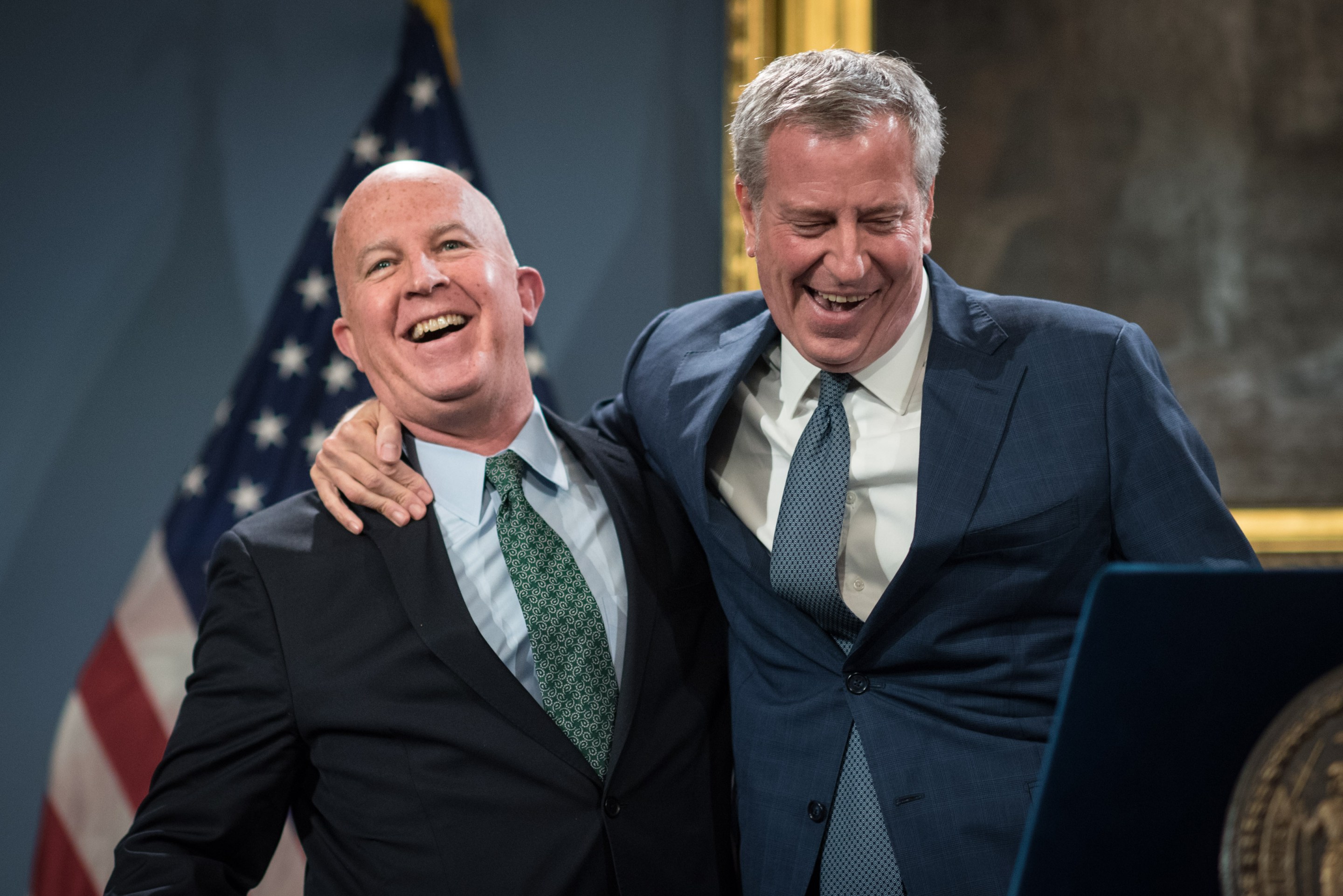
Mayor de Blasio and then-NYPD Commissioner James O’Neill. Michael Appleton/Mayoral Photography Office
It's the $1-billion solution.
Activists — and perhaps soon, some politicians — are focusing on cutting the $6-billion NYPD budget by $1 billion, and redistributed in a way that better benefits long-suffering communities and reduces police brutality.
As the city budget process begins, Streetsblog has been asking Council members to put an actual figure on their vague demands for cuts as part of the #defundTheNYPD movement, but none has provided a target number, citing ongoing budget negotiations. But the billion-dollar ask has long been championed by Communities United for Police Reform, and it was a prominent part of an open letter sent to the mayor yesterday by 236 current and former staffers who expressed shock at how badly he is handling the current situation pitting the NYPD against residents protesting police brutality. (Council Member Carlos Menchaca of Brooklyn is the only lawmaker to publicly commit to cutting $1 billion per year, according to the #defundTheNYPD tracker.)
The mayor should "reallocate that money to essential social services, including housing support and rental relief, food assistance, and health care, in alignment with the demands of the NYC Budget Justice campaign," the letter said.
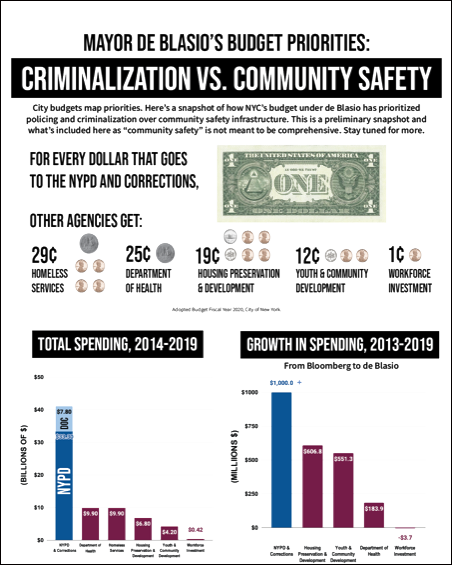
That demand went much further than other groups' seeking to rein in the NYPD. Scores of candidates for public office have pledged to cut the budget by $1 billion — over four years. The Policing & Social Justice Project chose the same four-year benchmark in a recent Daily News op-ed.
The police budget was $4.6 billion in fiscal year 2014, and overtime spending has ballooned from $576 million in 2014 to $728 million last year, the group said.
On Thursday, Comptroller Scott Stringer joined the four-year cut call, raising it to $1.1 billion.
We need to "shift responsibilities away from the Police Department — and its armed officers — and toward social workers, counselors, community-based violence interrupters, and other trained professionals better equipped to handle calls related to individuals in mental health crisis, homelessness, and other non-criminal activities, as many other cities across the nation already do," the comptroller's office said in a statement.
But Stringer, a likely mayoral candidate next year, went beyond the NYPD's involvement in such issues as providing services to homeless people in the subways, saying, “The brutal, senseless murders of George Floyd, Breonna Taylor and Ahmed Aubrey are the most-recent reminders of the longstanding need for racial justice and reform in policing. We must call out racism in all its ugly forms to break this painful cycle ... with accountability and concrete action."
Reiterating that a budget "is a reflection of our values," Stringer specifically called for:
- a hiring freeze and reduction of police officers to 35,000 by June, 2022 — which would approximate the headcount before Mayor de Blasio took over.
- a 5-percent cut in police overtime, which would amount to roughly $26 million — or $15 million more than the NYPD offered at a recent hearing.
- Better disciplining of police officers to start reducing brutality settlements, which hit $237.4 million in FY 2018.
"It is unconscionable that services for black and brown New Yorkers are on the chopping block while the NYPD’s budget remains almost entirely untouched," Stringer said. "This is a bold and achievable roadmap to immediately cut millions and instead invest those critical dollars in underserved communities and the programs that will uplift those New Yorkers who need it most.”
Does New York City simply have too many cops?
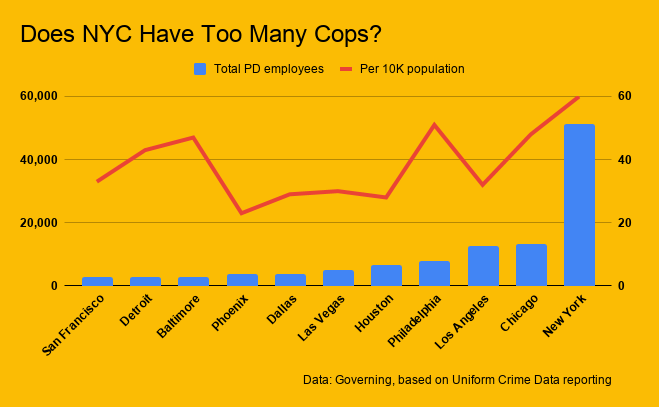
More and more people are pushing towards reining in the NYPD by demanding not only cuts to its budget, but also its headcount, including the elimination of a new cadet class as a symbolic gesture that would save $25 million.
But more may be needed. As the chart shows, New York City has far more police employees per 10,000 residents (red line) than other major cities, more than double the per capita staffing than sprawling cities such as Phoenix and Dallas, but also far more than dense cities such as San Francisco and Baltimore.
"There are too many cops," Rev. Kevin McCall, of the Crisis Action Center, said recently at the House of the Lord Church in Brooklyn, where NYPD Commissioner Dermot Shea recently stopped by to discuss policing issues.
"You got the summer youth program being cut. You got all these programs in New York City being cut — and they are giving more money to the police department. That’s not fair. Having the police department have all that money to do what — to beat us up again?" (One thing to worry about however: If cuts are made based on an officer's seniority, many younger cops will lose their jobs, and the NYPD, currently comprised of a slight majority of people of color, might get whiter.)
There is no evidence that more cops equals less crime. As the Marshall Project reported last year, "data show that the raw numbers of police have declined over the past five years. ... At the same time, the violent crime rate has also dropped." Crime in New York over the past decades is also at historic lows, but Mayor de Blasio increased the total NYPD headcount — of cops and non-uniformed employees — by 3,000 people between 2014 and 2019, bringing the entire department up to more than 50,000 employees.
The mayor's FY 2022 budget proposal, which cuts $2 billion in programs overall, called for a less-than-one-percent cut in the NYPD budget, compared to massive cuts to social service agencies and the Department of Transportation. The Department of Education would be cut by 3 percent.
"We will not pass any budget that includes just a 1-percent cut to the Police Department," Council Member Daneek Miller said at a press conference on Tuesday to announce a slate of bills to rein in police misconduct. "This budget has to be about equity and the values of our entire city."
Where do they live?
Another central issue when addressing police brutality against communities of color is the fact that 51 percent of the NYPD lives in suburban counties outside the five boroughs. Other police forces do a far better job of keeping their officers inside the city limits, living among the people the serve.
- St. Louis cops must live inside the city for at least seven years. White cops are more likely to move out after seven years, with 46 percent of them residing outside St. Louis compared to 32 percent of black officers, according to Five Thirty Eight.
- In Buffalo, newly hired cops must live in the city for seven years.
- In Chicago, cops must live in the city limits.
- In Syracuse, cops must live in the city for their first five years on the force.
- In Kansas City, cops must reside within city limits while employed with the police department (some officers cheat to get around the requirement, however).
What says de Blasio?
Mayor de Blasio has resisted all calls for cutting the NYPD budget, doing so earlier this week by misquoting a famous 1960s singer, which has become a disturbing habit of the mayor.
"I'm reminded of the song 'Imagine,' by John Lennon," the mayor said. "Everyone who hears that song in its fullness thinks about, what about a world where people got along differently? What about a world where we didn't live with a lot of the restrictions that we live with now? But we're not there yet."
In fairness to the slain Beatle, the song "Imagine" is a desperate call for peace that includes the line, "Nothing to kill or die for."
The mayor claimed that he has made significant reforms within the NYPD, including reducing stop-and-frisk and beefing up community policing, but for now, won't cut the agency's budget.
"For folks who say 'defund the police,' I would say that is not the way forward. At some point in our history, we may be in a very different situation. But, right now ... I think the impulse misses the reality we're facing right now."
For now, Council Speaker Corey Johnson vowed to swing a budget axe, but he would not specify a dollar amount when asked by Streetsblog this week, saying only, "We'll have that conversation."
He did say he and his colleagues would push in the short-term for measures to reduce police brutality, such as Intro 536, which would expand the definition of an illegal chokehold, and Intro 1309A, which would create a better process for disciplining rogue officers and give the public more tools to monitor the process.
"I can listen and use some of the power and privilege I have to help change the system," he said at a press conference on Tuesday that featured the Rev. Al Sharpton and Gwen Carr, the mother of Eric Garner, who was killed by a police officer in 2014. "The eyes of the world are on New York City. It is time for us to lead."
Johnson broke from his prepared remarks to specifically apologize to Carr.
"I'm sorry. I want to say I'm sorry that it has taken this long to pass these bills," he said. "These are bills that should have passed long ago. And I want to acknowledge the fact that it should not take a murder of a black man in Minneapolis to pass these bills. These bills should have passed after Eric Garner was murdered in New York City. ... In this moment of transformation, it is important for us to be honest, candid, self-reflective in a way that does not paper over the past and our past mistakes. So I want to say I'm sorry to Gwen Carr and the other families who have waited too long."
Carr put the very day-to-day actions of the police front and center:
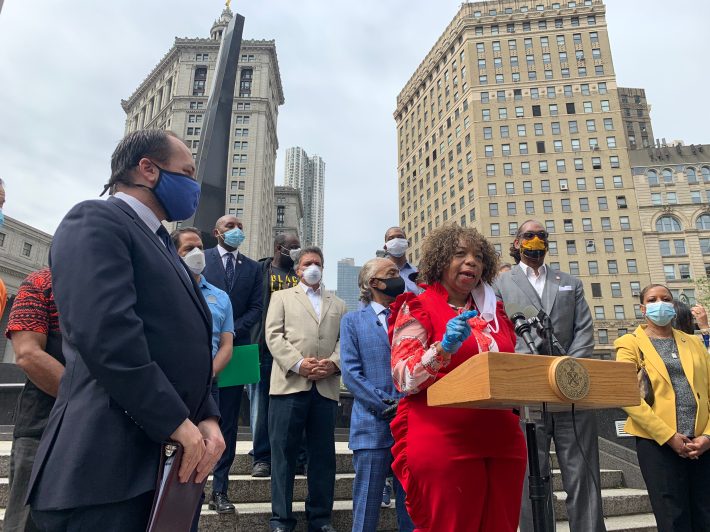
"They always think we are complaining [and say], 'Oh that didn't happen,' 'This didn't happen,'" she said. "But my reality is not your reality. You can walk down the street and don't fear the police stopping you for no reason at all. You can ride in your car and don't fear the police stopping you for being black. We have to talk differently to our black sons and daughters. When they walk out the door, we kiss them and hug them and hope they come back."
Streetsblog asked Sharpton if his travels around the nation over decades has convinced him that the NYPD simply has too many officers. He deflected.
"The question in New York is there is too little accountability," he said. "It is atrocious that this is the city where we have seen Abner Louima to Eric Garner, yet not seen a change in policy. ... Why do we give credence to the 1960s? Because we got a Civil Rights Act, a Voting Rights Act, HOPE housing act. But there has been no real Policing Act in this country or in New York. Everyone wants to have reconciliation without first having legislation. So what they're calling for is not peace, they're calling for quiet. They are telling us to shut up and suffer in silence.
"If you want peace, you bring justice. If you want quiet, you bring curfews," he said.
— with Steven Vago
Gersh Kuntzman is editor in chief of Streetsblog NYC and Streetsblog USA. He also writes the Cycle of Rage column, which is archived here.
Read More:
Stay in touch
Sign up for our free newsletter
More from Streetsblog New York City
Stockholm Leader’s Message to NYC: ‘Congestion Pricing Just Works’
"In Stockholm, people really thought that congestion pricing would be the end of the world, the city will come to a standstill, no one would be able to get to work anymore and all the theaters and shops would just go bankrupt. None of that happened."
Friday’s Headlines: Trump Trial Trumps Safety Edition
Is anyone going to bother to fix the dangerous mess on the streets and plazas around the Trump trial? Plus more news.
Adams Offers Bare Minimum to Seize Congestion Pricing’s ‘Space Dividend’ Opportunity
The mayor's list of projects supposedly meant to harness congestion pricing's expected reduction in traffic is mostly old news, according to critics.
OPINION: Congestion Pricing Will Help My Family Get Around As We Navigate Cancer Treatment
My partner was recently diagnosed with cancer. Congestion pricing will make getting her to treatment faster and easier.

